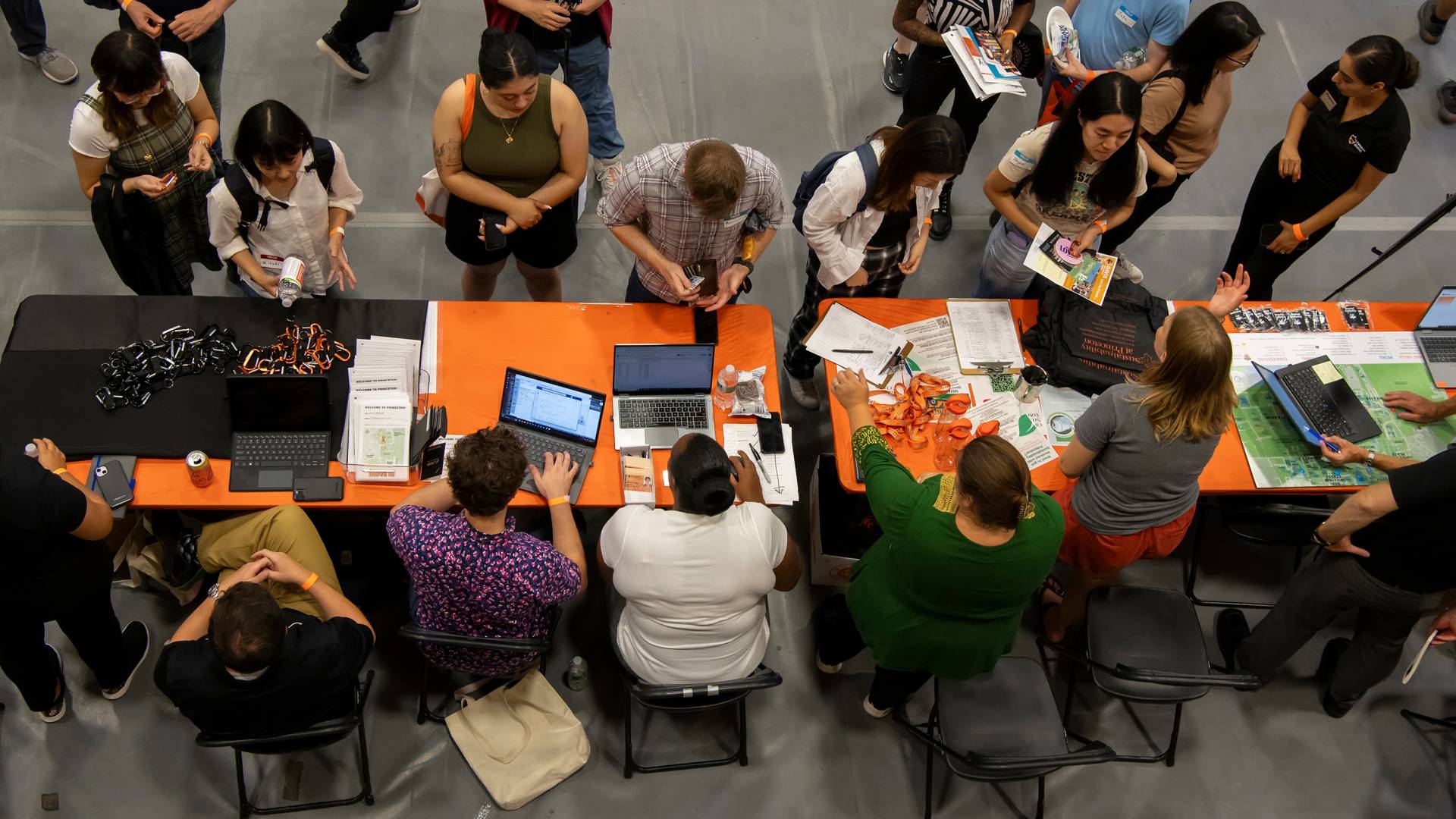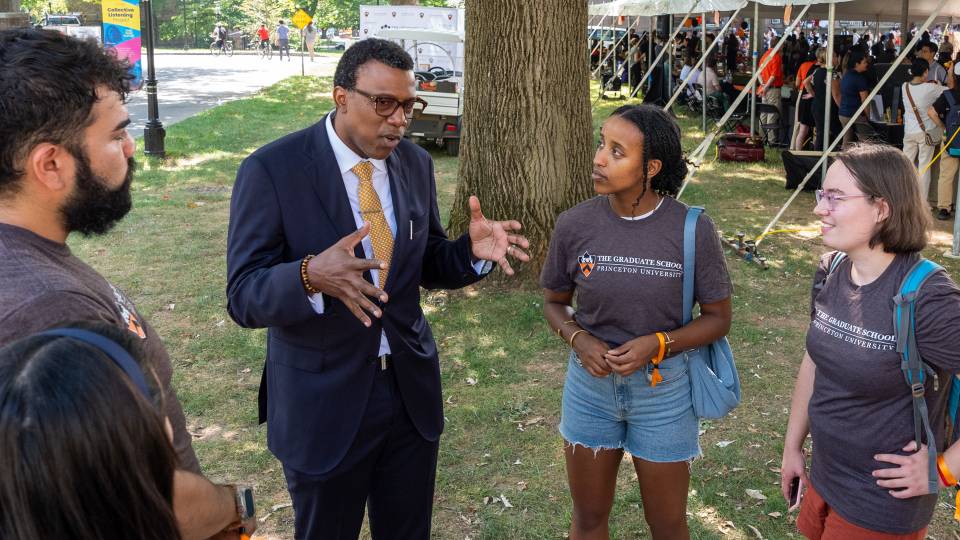The new cohort of graduate students made new connections at an information fair at Dillon Gym.
Princeton welcomed 765 graduate students for the 2023-24 academic year during orientation activities held Aug. 28 to Sept. 1. The new cohort of the Graduate School(Link is external) joins a community of graduate students from 96 countries spread across 43 departments and programs in the humanities, social sciences, natural sciences, and engineering, including the University’s first-ever graduate students in a new program in biophysics.
In his welcome remarks on Wednesday, Aug. 30, in Richardson Auditorium in Alexander Hall, President Christopher L. Eisgruber lauded the “tremendous creativity, diversity and talent” the new graduate students bring to campus from across the country and around the globe and encouraged them to take advantage of all that the University community has to offer.

President Christopher L. Eisgruber delivers a keynote address at the Graduate School orientation.
“You are one of the most diverse groups of entering graduate students in this University’s history,” he said. “Learn from that diversity, be proud of that diversity. It is part of what makes your group so interesting, so vibrant, so lively and so able to contribute to the excellence of this place.”
Eisgruber also noted in his opening remarks that Princeton and its graduate students enjoyed a special connection to this summer’s blockbuster film “Oppenheimer,” not only because part of it was filmed on campus and one of the characters was real-life Princeton graduate student Richard Feynman (though he’s not identified by name in the film) but also because of its important themes.
“It’s a big and compelling movie about science, government and moral questions,” Eisgruber said. “And for me, that connects to the graduate student experience here. It illustrates the need to think across boundaries, to think across the disciplinary divisions among the various departments in which you will study, and to think about what you are studying means for the world more broadly.”

In his opening remarks at orientation, Dean of the Graduate School Rodney Priestley encouraged the new graduate students to connect with others outside their department and to engage fully in campus life.
Graduate School Dean Rodney Priestley, the Pomeroy and Betty Perry Smith Professor of Chemical and Biological Engineering, expanded on Eisgruber’s reflections. “To effectively serve humanity through bold and transformative research and scholarship, we need the perspectives and voices of all segments of humanity,” he said. Twenty-one percent of this year’s incoming graduate students from the United States are from historically underrepresented racial or ethnic groups and about 25% are from first-generation or low-income backgrounds.
Priestley also spoke about Daniel Pink’s book “The Power of Regret,” which he read this summer. He said regret might seem an odd topic for incoming students but that it merited their consideration. He’d polled some of his colleagues and learned that their biggest regrets from graduate school included not connecting with others outside their department and not participating in campus life.
One colleague, he said, regretted not acknowledging their weaknesses because they thought everyone had to be perfect at everything in graduate school. Priestley turned that into a positive affirmation for the audience. “As my colleague said, acknowledging weakness is actually quite empowering because then you can address it: You can ask a lab mate for help. You can discuss your challenges with your adviser. You can decide how to tap into a strength to help your weakness,” he said. “My colleague noted that once they were bold enough to admit their weakness, the doors opened wide for them.”
Inspired to envision community
Indy Davis, an incoming graduate student in history from the Netherlands, said she was inspired by Priestley’s reflections. “Taking that moment to envision what you want to feel like when you leave here is truly an effective way to remind yourself to be mindful and proactive about how you are using your time and this community to your best advantage.”
Davis said the full slate of orientation activities made her feel welcome. “As someone who spent most their life outside of the United States, there was something extremely comforting about meeting people from very diverse backgrounds at every table I sat down at. Every chair was filled with people representing different countries, academic backgrounds and life stories.”
Earlier in the week, the Graduate Scholars Program (GSP) held its annual retreat for pre-doctoral and first-year graduate students. Forty scholars from across 22 departments attended the GSP retreat as part of their introduction to Princeton. Nearly 240 graduate students have participated in the program — which provides mentorship and social and academic support throughout the year — since it launched in 2018.

Youssef Amin (far left) of Queens, New York (musicology and neuroscience), and Caridad Estrada Cordona (second from right) of San Juan, Puerto Rico (civil and environmental engineering), enjoy a creative workshop with other new students during the Graduate Scholars Program retreat, held Aug. 28 and 29.
“I met students from all walks of life and countries, who shared their diverse cultural perspectives and the experiences that brought them to Princeton,” said Caridad Estrada Cordona, an incoming graduate student in civil and environmental engineering from San Juan, Puerto Rico. “Regardless of the differences in our cultures, it brought fruitful conversations and a dynamic authenticity to our now-shared identity as graduate students.”
She especially enjoyed a workshop on applying improv theater skills to graduate school, including an exercise where the participants finished each other’s sentences to create a story. “Not knowing the next words to be blurted out filled the room with so much laughter and joy,” she said.
Insights on thriving as scholars
The welcome event in Richardson Auditorium also featured a panel on “Success in Graduate School,” with faculty and current students sharing their insights about how to thrive as a graduate student. The panel was moderated by Lisa Schreyer, deputy dean of the Graduate School.
Kristopher Ramsay, professor of politics, encouraged the audience to acknowledge that research takes time and it’s important to be forgiving when things don’t go as quickly as expected. “The most important thing that I can say to you and that I tell my graduate students, is at the end of the day, be kind to yourself,” he said.
Claire Gmachl, the Eugene Higgins Professor of Electrical Engineering, noted the rigor of graduate work and that keeping your focus acts as a compass. “Get in touch with your big goal and always keep it in mind: Why are you here? Why are you doing this? Know it and put it out in front of you and remind yourself of it whenever you feel the need,” she said.

Kristopher Ramsay (left), professor of politics, and Claire Gmachl, the Eugene Higgins Professor of Electrical Engineering, shared their insights into the graduate student experience during a panel at orientation.
Néhémie Guillomaitre, a graduate student in chemical and biological engineering, who is also the artistic director of the student-led dance group the Princeton Highsteppers, encouraged the audience to embrace new interests and find ways to step away from academic work to recharge. “The number one thing is your health and your safety,” she said. “Do not be afraid to prioritize yourself, because you can only put out your best work when you are doing well. Work is great, but breaks are just as important.”
Cydney Gardner-Brown, a graduate student in Princeton’s School of Public and International Affairs, told the audience that fostering relationships with people in other academic departments will enhance their studies at Princeton and beyond. “You’ll be surprised at how connected all of our work actually is when you get an opportunity to chat with each other,” she said. “See each other as a community and not as competition.”
Following the panel, Karthick Ramakrishnan, the president of the Association of Princeton Graduate Alumni Association, who earned his Ph.D. in 2002, gave a warm greeting, and Bonnie Ko ’20, now a graduate student in music, led a lesson in singing “Old Nassau.” Afterwards, the new cohort made new friends and connections at a lunch and information fair at Dillon Gym.












